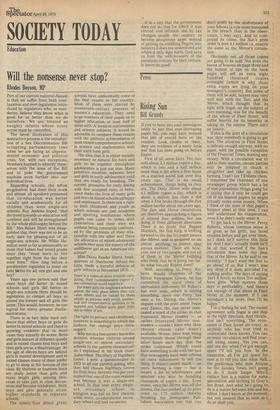SOCIETY TODAY
Education
Will the nonsense never stop?
Rhodes Boyson, MP
Part of our current national disease is that we suffer from both overtaxation and over-legislation introduced by legislators who, as mandarins, believe they know what is good for us better than we do ourselves. We are treated as naughty infants whose every action must be controlled.
The latest illustration of this destructive process is the introduction of a Sex Discrimination Bill occupying parliamentary time when we are facing an unprecedented economic and political crisis. Yet, with rare exceptions, Members hurried to identify themselves with the aims of the Bill and to poke the government machine even further into our individual lives.
Regarding schools, the leftist progressives had done their work and almost all speakers presumed that co-education was better socially and academically for all children than were single-sex schools. Roy Jenkins hoped "that the trend towards co-education will continue and will be strengthened by the whole philosophy behind the Bill." Mrs Renee Short was disappointed that there was not to be an early date for phasing-out of all single-sex schools. Mr Willie Hamilton went so far as presumably to insist that babies had mixed prams since they "must learn to live together right from the day they were born." How long before a government legislates to insist on twin births for all one girl and one boy?
Years ago one person said that since boys did better in mixed schools and girls did better in single-sex schools there should be legislation to compel all boys to attend the former and all girls the latter. This would, however, be too logical for many present Parliamentarians.
There is in fact little hard evidence that either boys or girls do better in mixed schools and there is growing evidence that in most cases they actually do worse. Boys and girls mature at different speeds and in mixed classes first boys and 'then girls are at a disadvantage. At the age of eleven boys are behind girls in mental development and in mixed classes many of them prefer to go to sleep at the bottom of the class. By thirteen or fourteen boys are orally better than girls and many bright girls, sensing this, cease to take part in class discussions and become withdrawn. Both boys and girls generally attain higher standards in separate schools.
The ninety-four direct grant schools nave undoubtedly some of the best results in the country. Most of them were started by nineteenth-century pioneers of women's education. They send large numbers of their pupils on to higher education, at least half of them with 'A' levels in mathematics and science subjects. It would be advisable to compare these results with the pathetic achievements of most mixed comprehensive schools in science and mathematics with their sixth form girls.
The idea that it is either socially necessary or natural for boys and girls to be together throughout adolescence is just not true. Many primitive societies separate boys and girls in early adolescence until they are ready for breeding. The current pressures for early dating with few accepted rules of behaviour make the lives of many girls and boys in mixed schools unhappy and unpleasant. Is there not a right to both childhood and youth in which schools are just academic and sporting institutions where pupils can come to terms with themselves and their own sex without being constantly confronted by the problems of their relationship with the other sex? Have the advocates of mixed adolescent schools ever seen the misery, of the wallflower girl in an American city school?
Miss Diana Reader Harris, headmistress of Sherborne School for Girls, made a forceful defence of girls' schools in November 1974:
There is a constant drive towards early dating, their contemporaries expect it, the commercial world exploits it.
For many girls the single-sex school is almost the only place where they can value others and be valued by them wholly as persons with social, intellectual and temperimental qualities to be enjoyed and fulfilled quite apart from the accident of sex.
The right to privacy and childhood, however, is something to which the fashion for change pays', little respect.
Why not in a free society leave the decision whether children attend single-sex or mixed secondary schools to the parents themselves? As I explained in my book OverSubscribed: The Story of Highbury Grove, I sent a questionnaire in 1972 to all our parents asking why they had chosen Highbury Grove for their boys. Seventy-five per cent replied that one of the main reasons was because it was a single-sex school. In that year every singlesex secondary school in Islington was full on first choices while every co-educational secondary school still had vacancies.
It is a pity that the government does not do that for which it was elected: end inflation and by tax changes enable the country to become prosperous again instead of putting its meddling fingers into subjects it does not understand and where it only does harm. God save us from the 'well-meaners' of the twentieth century for they certainly never do good!










































 Previous page
Previous page